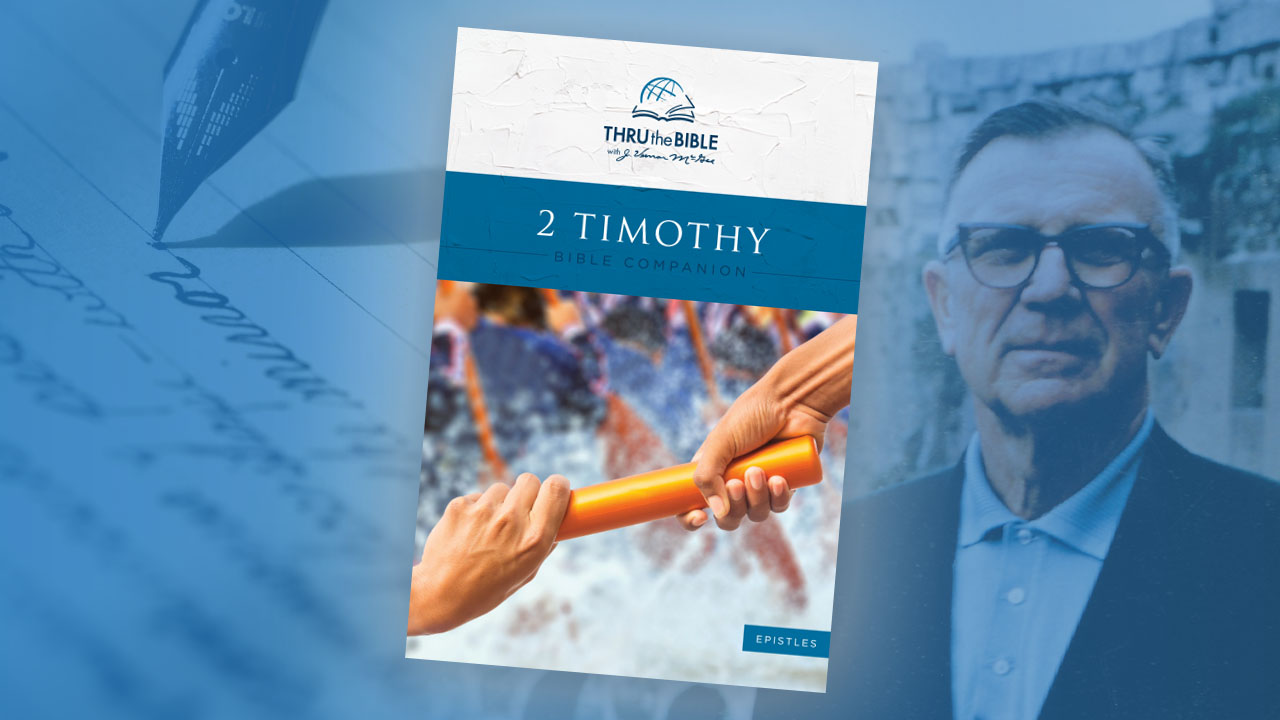Thru the Bible—2 Timothyनमूना

Last Words

Before you start todays devotional, ask the Lord to use it to grow you up in grace and in the knowledge of our Lord and Savior Jesus Christ.

“Come before winter if you can.” Paul finishes his letter with a note of sadness. He knew the time of his departure had come. He had finished his course. He was crossing the finish line. He had fought a good fight, and he had kept the faith. A crown of righteousness was ready for him.
But Paul was lonely. He’s in Rome, alone and incarcerated in a horrible Mamertine prison. He’s cold and asks Timothy to bring his cloak. He’s alone, and the hours are long. He asks Timothy to bring his books, especially the parchments.
As one who knows that his earthly life is all but over and is living in the reality of the time to come, Paul communicates solemn instructions, like he was already standing before God and the Lord Jesus Christ, who will someday judge our works for rewards.
Paul is saying in effect, “Think ahead, Timothy. Someday this will be you, standing before Jesus Christ to have your life judged. In light of that, this is what you should do today.” These instructions are just as relevant to us today.
First, be always ready to preach the Word. Preach it when it’s convenient or inconvenient—at any time. If someone wakes you up at two in the morning, you ought to be able to give out the Word of God. With conviction.
Notice that Paul doesn’t say to preach about the Bible. Nor does Paul say to preach from the Word. He does not say to lift a verse from the Bible and then weave a sermon around it. We are to preach the Word of God itself!
God uses His Word for various purposes in our lives, for whatever is necessary. Timothy was to use the Word of God to “convince” (convict) those in error. He was to use it to “rebuke” those in sin. He was also to use it to encourage (“exhort”) those living in harmony with God’s will. He was to carry on all of these activities—conviction, warning, and appeal—very patiently and with careful “teaching.” This verse has five imperatives: preach, be ready, reprove, rebuke, and exhort.
Keep alert (“be watchful“) to false teaching and be self-controlled in all kinds of situations. Endure hardship willingly, and continue to proclaim the gospel to the lost. This was the ministry God entrusted to him.
Almost with a big sigh of relief that he had communicated what he needed, Paul now writes his own epitaph. He says, “I’m now ready to be offered.“ You would've seen a bloody spectacle if you were in that execution room in Rome. To watch the brutal Roman soldier lift that tremendous blade above Paul’s head, then, with one fell swoop, sever his head from his body and see it drop into a basket on one side and the body fall limp and trembling on the other side. But Paul says if that’s all you saw, you didn’t see much. Paul’s life would soon disappear, and all that could be seen was Christ.
Finally, he says, “My departure is at hand.“ The Greek word for departure is analusis, a nautical term used for a ship tied up at the harbor, ready to put out to sea. “I’ve been tied down to the harbor,” Paul said. “But death for the child of God releases us.” Then Paul looks forward to the future where “there is laid up for me the crown of righteousness,” the reward for a righteous life. The Lord, the righteous Judge, will award not only Paul on that great day—but also all those who have loved and longed for and welcomed His appearing.
And now Paul knew he was going to be safely translated to heaven. “The Lord will deliver me from every evil work and preserve me for His heavenly kingdom. To Him be glory forever and ever. Amen!”
Paul concludes this personal letter by asking Timothy to greet their mutual friends. Love and affection exude with each line. He also relays greetings from those in Rome. He once again asks Timothy to try his best to come to visit him by winter.
This concludes the tremendous swan song of the apostle Paul.

1. What does it look like to live the Christian life in a way that is ready for Christ’s appearing?
2. What are some ways you can be watchful for false teaching?
3. Why was Paul able to view his own execution as an offering to God?
Additional Resources
Listen to Dr. J. Vernon McGee’s complete teachings on 2 Timothy 3:16—4:8 and 2 Timothy 4:6-22.
For a deeper study of 2 Timothy, download the 2 Timothy Bible Companion for free!

धर्मशास्त्र
About this Plan

Written in a Roman prison cell just before the apostle Paul’s execution, this extremely personal letter reflects on how Paul fought the “good fight” of faith and challenges us to do the same. Keep hoping, keep sharing, keep living out the gospel. Especially pertinent to those in ministry, these four short lessons from Dr. J. Vernon McGee encourage us to remain faithful to the end.
More
सम्बन्धित योजनाहरू

Psalms: Songs of Wisdom

Breaking Free From Spiritual Bondage

The Empowered Family: Discovering Strength Through Unity and Grace

The Evolving Family: Embracing Growth, Faith, and Transformation

IHCC Daily Bible Reading Plan - October

TheLionWithin.Us: Called to Be an Ambassador

Holy Song: 3-Day Devotional With Bethel Music

The Trailblazing Family: Courageous Faith and Uncharted Journeys

The Resilient Family: Strengthening Faith Through Life's Challenges
